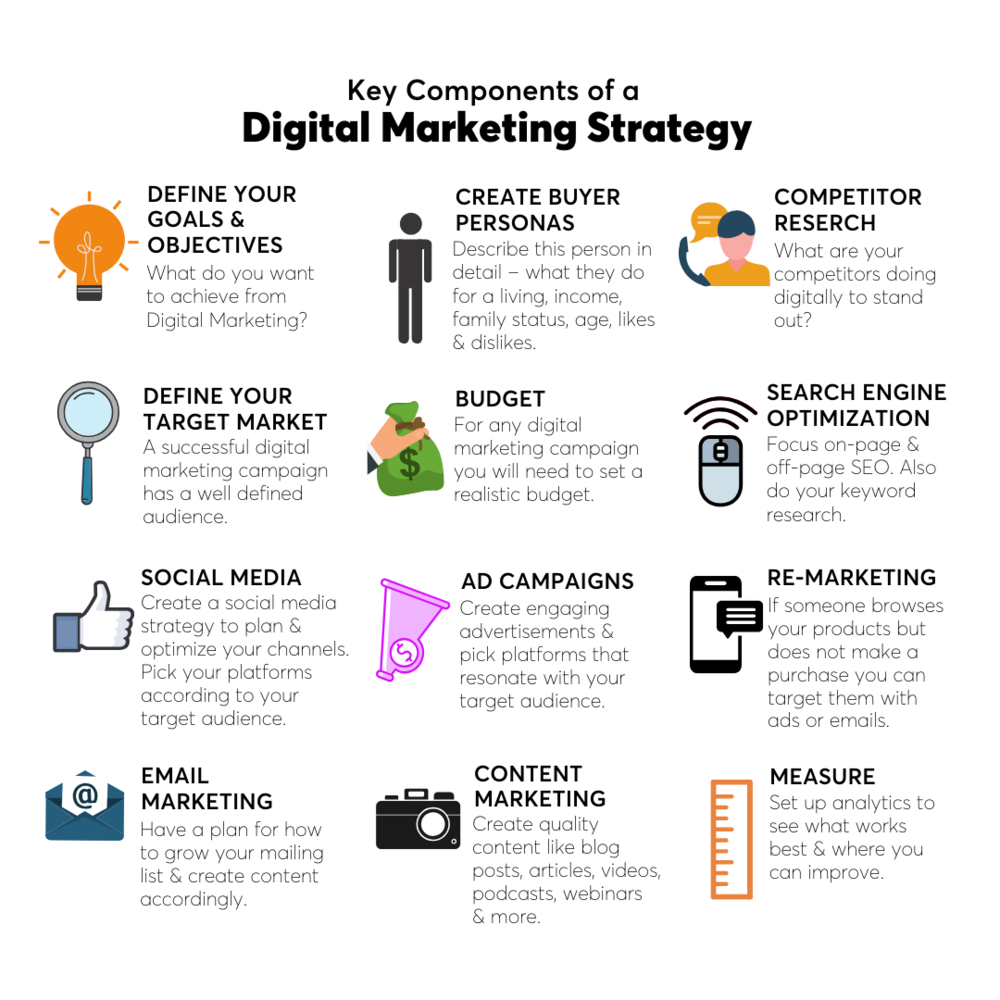A successful digital marketing strategy focuses on targeted audience engagement and measurable goals. It prioritizes data-driven decisions and ROI optimization.
Crafting a digital marketing strategy that stands out in today’s competitive online landscape is crucial for any business aiming to thrive. A well-orchestrated plan leverages the power of various platforms, from search engines to social media, ensuring that every campaign reaches its intended market effectively.
By integrating SEO, content marketing, email outreach, and analytics, businesses can create a comprehensive approach that not only attracts potential customers but also fosters brand loyalty. Aligning with consumer needs and industry trends, an effective strategy must be agile, adapting to the ever-evolving digital world. It should aim to deliver a consistent, engaging brand message across all channels while optimizing for conversions, ultimately driving sustainable growth.
The Essence Of Digital Marketing Strategy
The Essence of Digital Marketing Strategy lies in understanding how to connect with your audience effectively. It’s about making sure your message reaches the right people at the right time. A successful strategy blends various components to achieve its goals.
Defining Digital Marketing Success
Digital marketing success means reaching your business goals through online efforts. Success varies from brand to brand. For some, it’s about increasing sales. For others, it’s about boosting brand awareness or engagement.
- Increased website traffic
- Higher conversion rates
- Improved brand recognition
Measuring these outcomes helps businesses understand their strategy’s effectiveness.
Key Components Of A Solid Strategy
A solid digital marketing strategy rests on several pillars. Each component plays a crucial role in the strategy’s success.
- Clear Goals: Define what you want to achieve.
- Target Audience: Know who you are talking to.
- Content Marketing: Create valuable content for your audience.
- SEO: Optimize your content to be found online.
- Social Media: Engage with your audience where they spend time.
- Email Marketing: Keep in touch with your customers directly.
- Analytics: Track your results and adjust your strategy.
Together, these components create a roadmap for digital marketing success.

Credit: dharmilmehta.com
Setting Clear Goals And Objectives
A strong digital marketing strategy always begins with well-defined goals. These goals guide every action and decision. Without clear goals, efforts can become disjointed and ineffective. Let’s delve into how to set focused goals.
Identifying Target Audience
Knowing your audience is crucial. It shapes your strategy. You must understand their needs, preferences, and behaviors. This knowledge ensures your marketing efforts reach the right people. Use data to inform your audience profile.
- Age, location, and gender
- Interests and hobbies
- Shopping habits
- Online activity
Smart Goal Framework In Marketing
SMART goals bring structure to your strategy. They make your objectives measurable and attainable. Let’s break down the SMART framework:
| Specific | Measurable | Achievable | Relevant | Time-bound |
|---|---|---|---|---|
| Clear and precise goals | Quantifiable targets | Realistic ambitions | Aligns with vision | Set deadlines |
The Role Of Data In Crafting Strategy
Data shapes modern digital marketing strategies. A successful strategy relies on data analysis. Marketers use data to understand customers. This data guides all marketing actions.
Leveraging Analytics
Analytics tools provide insights into user behavior. Marketers track website traffic, engagement, and conversion rates. These metrics inform strategy adjustments. Real-time data allows for quick responses to market changes.
Data-driven Decision Making
Decisions based on data lead to better outcomes. Brands can identify what works and what doesn’t. This approach minimizes guesswork. It also maximizes return on investment (ROI).
- Identify trends: Spot patterns in customer behavior.
- Customize content: Tailor messages to target audiences.
- Optimize campaigns: Adjust strategies for better performance.

Credit: www.peppercontent.io
Content Creation And Curation
Content Creation and Curation are pillars of any digital marketing strategy. They engage and inform your audience. Great content drives traffic and converts visitors into customers. Let’s explore how to effectively manage these elements.
Developing A Content Calendar
A content calendar is a schedule of when and where to publish content. It ensures consistent content delivery. This tool helps in planning topics, formats, and publishing dates. It aligns content with key business events and marketing goals.
- Identify key dates: Product launches, holidays, and industry events.
- Plan content themes: Align with marketing objectives.
- Set a publishing schedule: Regular posts keep audiences engaged.
Quality Vs. Quantity In Content Marketing
Quality content should always be the focus. It builds trust and authority. Quantity without quality can harm your brand. Aim for valuable, relevant, and consistent content.
| Quality Content | Quantity Content |
|---|---|
| Engages readers | May overwhelm readers |
| Improves SEO rankings | Does not guarantee SEO improvement |
| Encourages shares and links | Less likely to be shared |
Multi-channel Approach And Integration
In today’s digital landscape, a successful marketing strategy must embrace a multi-channel approach. This means being present where your audience spends their time. From social media to email, each channel offers a unique way to connect with potential customers. Integration is key. It ensures all channels work together to create a seamless user experience. Let’s delve into how to choose the right channels and craft a unified brand message.
Choosing The Right Channels
Finding the best channels for your brand means understanding your audience. Start by identifying where your potential customers are most active. Consider factors like age, interests, and behavior. Use tools like analytics to make data-driven decisions. Below, find a simple guide to help decide:
- Demographics: Match platforms with user profiles
- Content Type: Align channels with your content format
- Engagement: Choose platforms with high user interaction
Remember, not all channels will suit your brand. Pick those that align with your marketing goals. Quality over quantity wins the race.
Creating A Cohesive Brand Message
A cohesive brand message is vital. It helps customers recognize your brand across different platforms. Consistency in voice and visuals is crucial. Use the same logos, color schemes, and messaging tones. This builds trust and reinforces brand identity. Here’s how to maintain consistency:
- Brand Guidelines: Develop a brand book for reference
- Content Calendar: Plan posts to maintain a consistent voice
- Staff Training: Ensure everyone is on the same page
Integration means all channels support one another. For instance, social media posts can drive traffic to your website. Email campaigns can highlight your latest blog content. This approach leads to a stronger, more unified online presence.
Seo And Organic Reach
A successful digital marketing strategy shines a spotlight on SEO and Organic Reach. This approach helps websites appear at the top of search results. It makes your site easy to find for people looking online. Let’s dive into how keyword research and building backlinks play a crucial role.
Keyword Research And Optimization
Choosing the right keywords is like picking the correct lock keys. It opens doors to more website visitors. Use tools like Google Keyword Planner to find words people search for. Then, sprinkle these keywords throughout your website’s titles, headings, and content. But remember, don’t overdo it. A natural touch works best.
- Identify high-search, low-competition keywords.
- Include keywords in meta titles, descriptions, and content.
- Monitor and adjust your strategy based on performance.
Building Authority Through Backlinks
Think of backlinks as votes of confidence from other websites. They tell search engines, “This content is valuable.” Aim for quality backlinks from reputable sites. This boosts your site’s authority and rank. Start with guest blogging, engaging in forums, and creating shareable content.
- Create content others want to link to, like infographics or guides.
- Reach out to industry influencers for backlink opportunities.
- Use tools to track your backlink profile and growth.
Both keyword optimization and building backlinks require patience and persistence. Yet, they are key to unlocking the full potential of your SEO and organic reach. Start small, keep improving, and watch your website climb the search rankings.
Paid Advertising Strategies
Paid Advertising Strategies play a crucial role in digital marketing. They help businesses reach their target audience quickly. A well-crafted strategy ensures higher visibility. Let’s dive into how to make the most of your ad spend.
Maximizing Roi On Ad Spend
To boost your Return on Investment (ROI), focus on these points:
- Target Accurately: Pinpoint your audience. Use data to guide your choices.
- Choose the Right Platforms: Not all platforms suit every business. Pick where your audience spends time.
- Ad Creatives Matter: Make ads appealing. Use clear images and concise messages.
- A/B Testing: Test different ad versions. See what works best.
- Analyze and Adjust: Keep an eye on performance. Make changes as needed.
Retargeting And Conversion Tactics
Retargeting turns viewers into buyers. Use these tactics for better conversion:
- Pixel Tracking: Place a pixel on your site. Track visitors for retargeting.
- Segment Your Audience: Not all visitors are the same. Tailor your messages.
- Personalized Ads: Show ads based on user behavior. Make them feel special.
- Landing Pages: Direct users to a specific page. This boosts conversion chances.
- Email Follow-ups: Sometimes, emails remind users of what they viewed. Use this to bring them back.

Credit: www.linkedin.com
Monitoring And Adapting To Change
Monitoring and Adapting to Change is crucial in digital marketing. A strategy must evolve with market dynamics. Brands that track performance and adapt, thrive. Flexibility and awareness of digital trends are key.
The Importance Of Flexibility
Successful digital marketing requires agility. Change is constant. Strategies need quick adjustments. This ensures ongoing relevance and competitive edge.
- Data analysis: Real-time insights guide strategy tweaks.
- Customer feedback: Direct input shapes campaigns.
- Technological updates: New tools can improve efficiency.
Keeping Up With Digital Trends
Staying current is non-negotiable. Trends influence consumer behavior. Marketers must keep pace.
| Year | Trend | Impact |
|---|---|---|
| 2023 | AI Personalization | Higher engagement rates |
| 2023 | Video Content | Greater reach |
Frequently Asked Questions
What Does A Successful Digital Marketing Strategy Build Coursera?
A successful digital marketing strategy on Coursera focuses on building comprehensive knowledge in SEO, content marketing, social media, and analytics for effective online campaigns.
What Is The Primary Focus Of Digital Marketing?
The primary focus of digital marketing is to engage customers online through various channels like social media, websites, and email to drive sales and brand awareness.
What Are The 5 Main Strategies Of Digital Marketing?
The five main strategies of digital marketing are: search engine optimization (SEO), pay-per-click advertising (PPC), social media marketing, content marketing, and email marketing.
What Is The Most Important Factor For Success Of Digital Marketing?
The most important factor for digital marketing success is understanding and targeting the right audience effectively.
What Defines A Digital Marketing Strategy?
A digital marketing strategy is a plan focusing on using digital channels effectively to achieve business goals.
Why Is Target Audience Important In Digital Marketing?
Understanding your target audience enhances campaign relevancy and increases engagement rates.
How Does Seo Impact Digital Marketing?
SEO improves online visibility, driving organic traffic to your website, crucial for long-term success.
What Role Does Content Play In Digital Marketing?
Content engages audiences, builds trust, and positions a brand as an industry leader.
Conclusion
Crafting a digital marketing strategy that delivers requires focus and adaptability. Align your goals with market trends and consumer behavior for true impact. Remember, a dynamic approach ensures your brand thrives in the digital arena. Embrace innovation, measure results, and refine your tactics to stay ahead.
Success is within reach with a targeted, flexible strategy.


